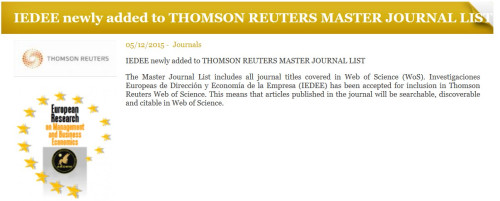
The Thomson Reuters Master Journal List is not a journal whitelist and should not be used as one. Numerous low-quality and predatory journals are announcing their inclusion in this list as a mark or guarantee of quality, fooling many.
The purpose of the list is to serve as a comprehensive list of journals included in at least one of 24 different journal indexes produced by Thomson Reuters. If a journal is included in one or more of these indexes, it appears in the master list.
This is a problem because the barrier for entry into some of the Thomson Reuters indexes is very low. Take the index called Zoological Record, for example. It includes over 4700 journals, including many predatory journals that are unworthy of being included in any quality scholarly index.

The journal shown in the top image above, Investigaciones Europeas de Dirección y Economía de la Empresa (IEDEE) is an example. It provides misleading information about the TR Master List.
On its home page, the journal declares,
“IEDEE newly added [sic] to THOMSON REUTERS MASTER JOURNAL LIST
The Master Journal List includes all journal titles covered in Web of Science (WoS). This means that articles published in the journal will be searchable, discoverable and citable in Web of Science.”
This is somewhat misleading. It’s included in one of Thomson Reuters easiest databases to get into, its Emerging Sources Citation Index.
Here’s a screenshot of the journal’s entry on the TR Master List:

As you see, according to the entry, it’s only included in Emerging Sources Citation index, a list I’ve documented as containing junk journals.
I encourage all ministries of education, all universities and colleges, all academic departments, and all funding agencies to stop using the Thomson Reuters Master List as a measure of quality.
The list is filled with dozens or hundreds of low-quality and predatory journals. Using this list as a quality indicator actually promotes the lower quality, open-access journals included in it, for it serves as advertising for them, drawing in authors seeking easy and fast acceptance of their article submissions.
By: Jeffrey Beall
Follow on Twitter
Source: Scholarly Open Access





